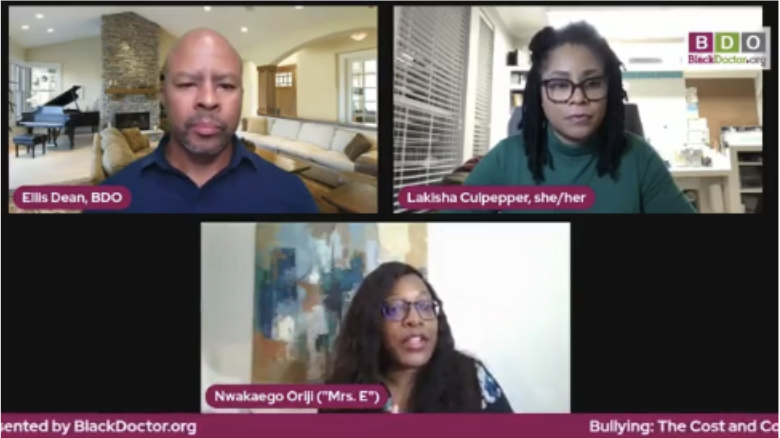
The month of October is national bullying awareness month. And many people don’t know that so we wanted to pay some respect to that particular topic. This month, additionally, there was an incident in the state of Texas earlier this month. It’s sad to say that in this country, we have gotten a little too numb to shootings happening. It was unique because this particular child that committed the shooting, was being bullied. And the person that was the target of the shooting was the person that had allegedly beat this young man. He said he had been robbed twice, and his story is that he had notified the administrator/administration and he had told his parents, and I guess according to his actions, whatever transpired was not satisfactory in terms of his feeling safe and really that’s what it’s about…bullying.
How is bullying actually defined?
Lakisha Culpepper: That’s a great question. What I can tell you is like many things, the definition of bullying has been very fluid. Bullying is defined as a single significant act or a pattern of acts by one or more students directly at another student that exploits an imbalance of power and involves engaging in written or verbal expression. Expression through electronic means or physical conduct. It’s harmful to the other student, is severe and persistent. It’s materially and substantively disruptive to that student in their environment and it infringes on their rights and sets them up to feeling victimized.
In essence, we don’t tell a parent that your child feels like they were bullied, but they weren’t, that’s not our place to say, if a parent comes to you, if a student comes to you and says, I feel as if I’m being mistreated, even if they don’t use the word bullying, we take that very serious. And yes, the definition governs what policies and action steps we have to take. And we follow that to the lettert, like every other district does, but above everything else, we’re concerned with the social, emotional, mental, and academic wellbeing of students. So whether it’s severe in your eyes, in my eyes, if it’s severe to that family, it should be taken seriously. And that’s the trick. These words we use in the definition from district to district can really be objective if we’re not careful. And so we want to handle everything as if it is the most important thing that child is dealing with because in their world, in their mind and heart, it is.
Are there any things that kids could be doing or is it just random? Are there any things kids could be doing better, more protective in nature to stop themselves from being bullied? Or is that something that is just random and the bully’s going to be bullying?
Culpepper: Dr. D what I’m going to say is two things like the first thing is… yes and no. We create the space for our children to uniquely be themselves, and we give them permission and power to use their own voice. So I like to say permission and power. So as a parent, I give my child permission to say no to whomever, they need to say no to at any time. The power to really exercise that note to the fullest extent, which includes getting up and walking out of class for my kids.
Nwakaego Oriji (Mrs. E.): Empowering students to have a voice, to be able to, defend themselves to show how they want to be treated and to tell others how they want people to treat them. Everyone has the right to be able to do that. And I also think that, some of the burden lies on us as educators to be preventative in nature when it comes to bullying instead of reactive. So in, in educating parents, educating students on signs of bullying, this is what you can do, giving them, providing resources also helps to provide a protective layer around our students as they continue to delve into and go through this thing called school. So I just said it, there are some things that the student can do, but then it’s also a burden that lies on us as the district and the educators to be able to utilize those preventative measures, to even stop it from even happening in the first place.
Let’s talk about cyber bullying and how that has really escalated bullying behavior. Because now you can get more than just the one or two or three kids jumping on somebody. You can get an entire school – kids that don’t even know a person because you got videotaped being joked. And now it’s on social media and everybody’s talking about how sorry you are and blah, blah, blah.
How has social media and cyberbullying really changed the perspective and landscape of bullying behaviors?
Nwakaego Oriji (Mrs. E.): It has changed the game in bullying because before it was just, like you said, two or three people that witnessed, some kind of altercation or some kind of situation or incident, but then when you put it on social media,there can be thousands of people that witnessed that and are commenting on it. So it just ups the ante, so to speak and how it makes that person that’s being bullied feel. That’s why we see all of these situations with suicidal ideations. That’s why we have students who get violent because of lashing out. So I think social media has exacerbated the actual whole of response of students that are actually being bullied in just such a way that it’s kind of hard to put a cap on it, to keep that under wraps, just because it just explodes and goes out so easily and to so many people. And so it really gives a challenge to the school districts and the administrators and parents. It gives a challenge to those individuals that are trying to kind of stop bullying. It just challenges us to find new and unique ways to be able to help students that are affected by cyber bullying. But it is very difficult. It’s hard because of the reach that social media does have. So it just makes us have to think about different ways in order to help to protect kids when they’re going through those situations.
Culpepper: And one of the things I’m finding, that’s so interesting because it’s not only that keyboard warrior, right. But it’s also the keyboard warrior with absolute anonymity. I’ve often found that families come to me with children who have been cyberbullied, or who are dealing with cyber bullying. And that child walks in my office with a cell phone still in their hand with those apps on.
The kid that’s being targeted is still watching the comments every day and still looking at it every day and reading it and wanting to show it. And to me, that’s equally as disturbing because I also worry that if your child is being targeted, let’s say on a Snapchat or some, one of those apps of that nature to then allow that child to continuously be on it and still use it worries me as well. And I’ve had parents say, well, you know, but they want to talk to their other friends.
We see usage from our children as young as seven and eight. Because developmentally you’re hooked and addicted to the stimulation and the socialization you get on that app. So that even when you’re targeted there, you can’t seem to break away from it. It’s very frightening.
What are some things that we can do? What are some tools that we can give our audience that we can give parents that we can give other administrators to be able to identify and help a child through a situation that they might be faced with being bullied?
Culpepper: I would say to students, teachers, parents, everyone, if you see something, say something, if you see a child acting out of character, say something. If you see someone sitting alone by themselves, say something, if we really want to see positive change, we have to all be willing to be the person that says something and does something. When we see something that doesn’t look right. Sound right. Smell right. It just ain’t right. So that would be my advice for us. See something, say something.
Nwakaego Oriji: What is it that you’re going to do even before it occurs? This is how you, hold up under those difficult and trying times helping our students to understand that and to realize that is extremely important. And then utilizing the resources we have on the campus. We got principals, we have administrators, we have school. Um, all individuals are willing to help in order for our students to be safe.
Culpepper: Are we modeling what self-esteem looks like? Are we modeling confidence? Are we modeling voice? Are we modeling that power? Or are we modeling self doubt? And so that would also be my advice, especially to the moms on the call, because it is hitting our girls harder statistically than, than anyone else… this self-image and this body image that we’re seeing on social media. So that would be a takeaway, I would say as well is we’ve got a model behavior as grown folks. What it looks like to be the voice, to be the change, to be healthy, to be whole, to be well, and to be wise, we’ve got to live that before them. So they know what it looks like.
As parents in particular, be careful about sending mixed messages. Sometimes parents get so happy in terms of telling everybody how well their child is doing. And then don’t engage with them when they’re not doing something that they could share to the world. Yeah. And what happens is you’re sending a mixed message to your child is my value is only when I could do something to make you happy. And that is impact just as impactful in that child’s self-esteem as being, you know, abusive is because you’re telling them they have no value. If you’re not doing something to make me feel good. And so we have to be able to teach our children that they are valued, whether they’re doing something that’s great, whether they’re running score touchdowns, where they’re just in the stands, watching the game, they are just as valuable.
To watch the full Facebook Live visit https://www.facebook.com/BlackDoctor.org/videos/851045698821424








